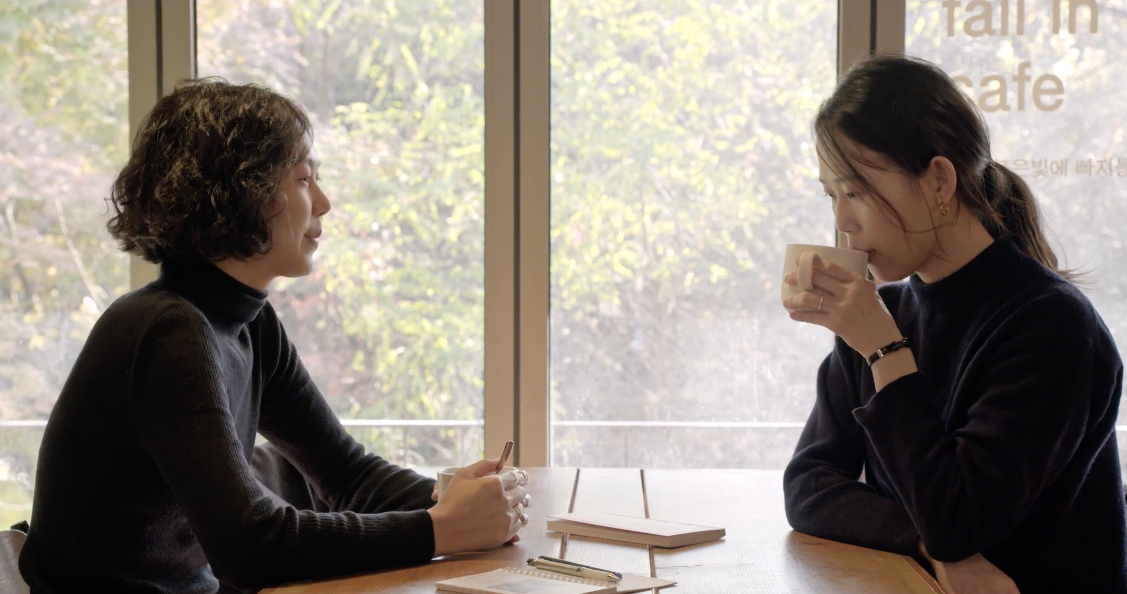WOMAN WHO RAN, THE (Domangchin yeoja)
(director/writer: Hong Sang-soo; cinematographer: Kim Sumin; editor: Hong Sang-soo; music: Hong Sang-soo; cast: Kim Minhee (Gamhee), Seo Younghwa (Young-soon), Song Seonmi (Su-young), Kim Saebyuk (Woo-jin), Lee Eunmi (Young-ji), Shin Seo-kho (Cat Man), Sung-guk Ha (Young Poet), Kwon Hae-hyo (Mr. Jung); Runtime: 77; MPAA Rating: NR; producer: Hong Sang-soo; Jeonwonsa Film; 2020-South Korea-in Korean with English subtitles)
“Playful, breezy and uneventful drama.”
Reviewed by Dennis Schwartz
The Woman Who Ran played at the Berlin Film Festival, where Hong Sang-soo won the Silver Bear for Best Director.
Prolific South Korean filmmaker Hong Sang-soo (“Hahaha”/”Hotel By The River”), with twenty-four features made in twenty-four years as a filmmaker, writes and directs this playful, breezy and uneventful drama. The auteur’s trademark minimalism is at work, as he has little to say. For the men he only shows their backs in the film, while the women are engaged in friendly but banal conversations that seem to repeat themselves about such topics as real estates and vegetarianism.
The film is divided into three parts, in which the same woman meets three different friends and runs accidentally into another.
Gamhee (Kim Minhee, the director’s real-life girlfriend and film muse in his last seven films) is a Seoul florist who visits two roommate girlfriends living in a middle-class apartment block on the outskirts of Seoul, the recently divorced Youngsoon (Seo Younghwa) and the affable Youngji (Lee Eunmi). This is the first time Gamhee is not with her hubby, who is away on his first business trip after five years of marriage. Tension mounts when a male neighbor (Shin Seo-kho) comes by to interrupt their chat and requests that cat lover Youngji stop feeding the stray cat because his wife has a cat phobia and will not leave the house if the cat is around. The women and the cat glare at him as if he’s a Martian.
In part two, Gamhee runs into the older bleach-haired Suyoung (Song Seonmi), a Pilates instructor bothered by a pushy young poet (Sung-guk Ha) admirer who won’t stop trying to be with her even if rejected, as ever since she was drunk one night and slept with him he has been pestering her.
In part three, Gamhee runs into by chance, at the art-house movie theater, her estranged friend Woojin (Kim Saebyuk), who works there. Her famous novelist husband (Kwon Hae-hyo) used to date Gamshee. Now, in his many TV appearances on talk shows, he has nothing new to say as he keeps repeating himself.
The minor film takes place over a three-day period, and is wistful and slight. The everyday conversations women have when no men are around are seen as more amusing the more trivial they seem to be.
As for the title, I have no idea who Hong Sang-soo is referring to (no woman seems to be on the run). The third act might offer some clues for those who like solving such mysteries on their own. I prefer titles that can immediately connect me to the film, and found this one too vague.

REVIEWED ON 3/6/2020 GRADE: B